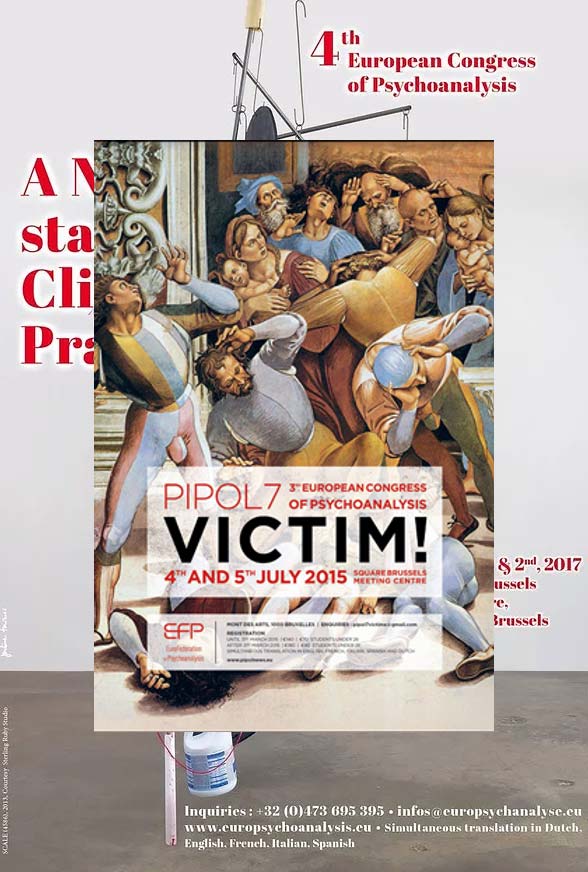PIPOL 7
“VICTIM!”
PIPOL 7, the third congress of the EuroFederation of Psychoanalysis, entitled “VICTIM!”, will take place at the Palais des Congrès in Brussels on the 4th and 5th of July, 2015.
A meeting for all who practice in institutions within Europe, with reference to Freudian psychoanalysis and its Lacanian orientation, the EFP congress is also an event where the recent theoretical and clinical advances of the different European Schools, specifically the AEs, will be presented.
PIPOL 7 : Victim ! How can we escape it ?
Be it a name of the symptom or its cause, “victim” is a ready-made signifier of consumerist modernity. One can be a victim of the climate, of pollution, of one’s neighbour, of one’s job, of love or of hatred. Once limited to the legal, medical or military fields, the word “victim” has invaded the media, carrying in its wake the sensationalism it revels in. Thus the victims of delayed trains get confused with the victims of accidents, the victims of our economic situation with the victims of crooks. And there can be no forgetting the victims of natural catastrophes, of genocides, of armed conflicts. Even more insidious and within the family, incest and child abuse, lack of attention and lack of love have also taken their toll and made their victims. But, beyond the perversity of sado-masochistic game-playing, the victim and his torturer are the fantasmatic parts that are written time and time again for many a cinema, TV series and literature character. Traces of this trend can be observed recurrently in analytic experience. It is nonetheless in analysis that one demonstrates that repetition does not necessarily turn into fate.
Insofar as it has been borrowed from everyday language, the signifier “victim” thus illustrates an ambiguity in our relation to the Real, which is found in the fantasy that veils it, or in the claim from an injury. In contemporary social exchanges it is used as if it was equivalent to subjective effects – in each French police station, a “victim” can seek specialized counselling – yet, at the same time, it is blurring the line between history and political news, confusing great and small events and making victims out of everybody.
Those who experienced the dramatic moments of history have taught us that the victim’s position was not the best answer to what they had gone through. Therefore it is a position that they often rejected. Psychoanalytical experience demonstrates that the solutions that are elaborated by those who have been seriously harmed vary from one individual to the next, depending on the singular solution that each person can find to face the effects of the repetition at work in his/her life.
The different social and political discourses in European countries expose the analysts in our institutions to encountering the ambiguous and hegemonic category of the “victim” while recognizing the singular solutions the Lacanian orientation enables us to support.
Rather than going with the flow of cognitive-behavioural therapies who promote the figure of the victim in order to sustain their furor sanandi, the experience of psychoanalysis clears a space where fantasy, as a mask of repetition, may lead to a treatment of the real that is in play. Such are the issues that will be at stake during PIPOL 7. We hope to see you there.
Jean-Daniel Matet
Translation by France Jaigu
